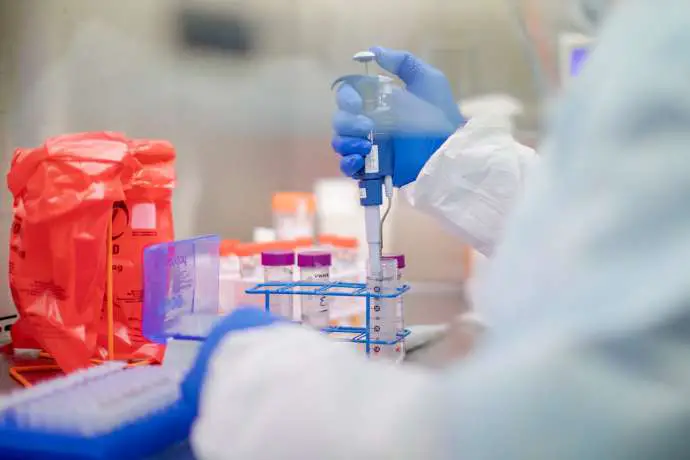STA, 6 May 2020 - A government report on PPE purchases, released on Wednesday, says all procurement was executed in line with protocol and amid difficult circumstances that were aggravated by the failure of former PM Marjan Šarec to react sooner. The report says all the ordered ventilators had expert backing.
Announced by PM Janez Janša after the 24 April whistleblower accusations about heavy political meddling, the report provides insight over 80-plus pages into the stock of personal protective equipment before the epidemic and the current situation, stressing the PPE available on 16 March did not suffice for even a single day of the assessed needs at the time.
Accusing Šarec of omission of duties that could qualify as misfeasance in office, the report says "the most contentious decision was not to order quarantine for potentially infected individuals returning from Italy as a hotspot, and that the border with Italy was not closed in time or controlled with health checks".
It says that the little equipment that had been ordered under Šarec had been ordered at higher average prices than under the current Janez Janša government, even though the latter had to buy at one point irrespective of the prices.
While the World Health Organisation already warned on 3 March that PPE prices and supply times were rising drastically, the Šarec government did not call on the Health Ministry to start buying until 11 March, the reports says.
Šarec responded by tweeting: "Manipulative, misleading and unworthy of the paper it is printed on. Nothing about corruption and war profiteering."
Končno smo dočakali poročilo vlade o nakupih zaščitnih sredstev. Pričakovano, v stilu "mi smo super, odlični, če je pa karkoli spornega, je kriv MŠ". Manipulativno, zavajajoče in nevredno papirja na katerem bo natisnjeno. Nič o korupciji in vojnem dobičkarstvu.
— Marjan Šarec (@sarecmarjan) May 6, 2020
Meanwhile, elaborating on the procurement procedures, the reports says that procurement was centralised under the Commodities and Reserves Agency on 14 March, one day after the Janša government took over.
Given the agency's lack of staff and experience with such situations as well as Covid-19 cases there, the government formed on 24 March an inter-ministerial taskforce to receive, examine and evaluate bids for PPE supply. The group received 2,069 e-mails until 14 April, examining 1,081 of them.
Another coordination group was formed by the Economy Ministry on 25 March, but its members are said to have only "forwarded proposals to the Commodity Reserves Agency and coordinated activities for a quick supply of protective equipment".
"All final decisions were taken by the Commodity Reserves Agency," the report says, while explaining that the agency's deputy head Ivan Gale - who later spoke publicly about pressure by a number of influential individuals, in particular Economy Ministry Zdravko Počivalšek - had also been part of the coordination group.
Zooming into the period of the media-scrutinised orders of over 300 ventilators, the report says that the agency "signed between 16 and 24 March 21 contracts with PPE suppliers and 4 contracts with ventilator suppliers, with the Economy Ministry not being involved in negotiations and the signing of individual contracts".
"In this period the Economy Ministry got more actively involved only in the purchase of ventilators, urgently needed by hospitals to save lives," the report says, while adding the ministry did not have any decision-making powers here and that its approval needed for each contract only checked compliance with a five-year state programme for commodity reserves.
As for the choice of ventilators ordered in this period, the report says the numbers had been based on assessed potential future needs at the time and provides charts with ventilator offers, including expected supply times, and orders.
The much discussed 220 Siriusmed R30 ventilators ordered on 18 March through Geneplanet for EUR 8 million are listed among ventilators approved by experts. The reports says they got the "approval of Dr. Podbregar from the Celje General Hospital", while "the remaining three bids were approved by Dr. Noč, Dr. Gradišek and Dr. Knafelj from UKC Ljubljana".
Meanwhile, the report defends the decision to use intermediaries in the PPE purchases, saying the state could not afford to shoulder the high risks that were involved and have indeed been experienced in many countries.
It argues in favour of some much criticised domestically produced masks, including a batch made from material normally used for kitchen towels, and their high prices, saying each producer got the nod from UKC Ljubljana and that it was misleading to compare production costs at the time to current prices.
As for future steps, the report says that sufficient supplies for the short term have been secured by 10 April. The Commodity Reserves Agency, whose centralised procurement of PPE will end on 1 June, now has more space to negotiate on prices.
The government is proposing that the Court of Audit review the agency's activities in the first four months of the year and also look at all the purchases, renting and maintenance of ventilators in all Slovenian hospitals in the past five years.
It announced it would secure EUR 1 million for the start of ventilator production in Slovenia and another million for the production of FFP2 and FFP3 masks.
All our stories on the PPE scandal in Slovenia are here






